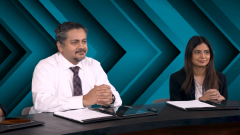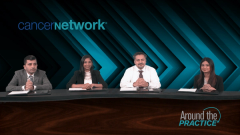
Future Perspectives: Treating Multiple Myeloma With Novel Regimens
An overview of what’s next, in terms of the use of various frontline treatment regimens, that include novel agents to manage patients with newly diagnosed multiple myeloma.
Episodes in this series

Saad Z. Usmani, MD: Before we close, I’d like to get some key takeaways and future perspectives for the treatment of patients with newly diagnosed multiple myeloma, including those with high-risk disease. I can start with Dr Shah.
Urvi Shah, MD: This was a great discussion. We have answers, but there are a lot more questions with these new trials and data. It’s important to have a conversation with patients and try to bring up a little of the data. One thing is that quadruplets are here, and they’re probably here to stay unless the trials look very different. In terms of maintenance, we’re going to be doing a single-drug maintenance—which is the standard of care now—but the question about doublets remains an open question. Relapsed myeloma is a moving target, and it depends on what treatment the patient is getting up front. That’s going to keep changing.
Saad Z. Usmani, MD: I couldn’t agree more. Dr Mailankody?
Sham Mailankody, MD: Looking at big picture, in 20 years we have 10-plus new drugs that have become available for patients with myeloma and great progress in terms of progression-free survival and overall survival. Through all this, patients with high-risk myeloma tend to be somewhat of a black box, unfortunately, both in terms of how we define them and how we’re still using cytogenetics for the most part—which are very useful, but there may be ways to refine our definition of high risk to accurately identify the 20% to 25% of patients who truly have high-risk disease.
The area we should focus most of our efforts on is with novel therapies in the front line. For many patients, the sequential approach of combinations and other treatments might work very well, but it’s the high-risk patients for whom we’re thinking slightly outside the box—in the context of clinical trials, to design trials that incorporate more effective treatments in 2021, newer targets, and newer mechanisms of action. Those are all available to us, so trying to integrate them quickly and finding out which of these different strategies might be helpful is the way forward for patients with high-risk myeloma.
Saad Z. Usmani, MD: I agree. That’s an area of unmet need, and that’s where we need to make a lot of advances. This is the right time to do it. Dr Korde, last but not least, please.
Neha Korde, MD: I’m excited to see what happens with MRD [minimal residual disease] testing in the future, whether it will be taking patients off therapy—I hope we get to a point where we can take some of our patients off therapy—or defining who those patients are and how we can better help them. Eventually, once we get to a cure, it’s going to end up being defined by an MRD method. In the future, we’re looking at not just therapies but also tools defining what therapies work better.
The question of MRD status is fascinating because 1 thing I’m looking forward to understanding is if all MRD-negative states are equal. For instance, if an MRD-negative patient comes off transplant or post–CAR [chimeric antigen receptor] T cell, is he or she the same as somebody who’s just come off therapy? As we start to mature in terms of research, we’ll begin to understand the microenvironment around what exactly that looks like. That’s going to be important in the future.
Saad Z. Usmani, MD: Thank you, Drs Korde, Shah, and Mailankody. You’ve been wonderful. This has been a lively discussion. Thank you for joining me. This program has been brought to you by Cancer Network®. I would like to thank our viewing audience. We hope you found this interactive discussion to be informative and beneficial to your clinical practice. Thank you so much.
Transcript edited for clarity.
Newsletter
Stay up to date on recent advances in the multidisciplinary approach to cancer.




































